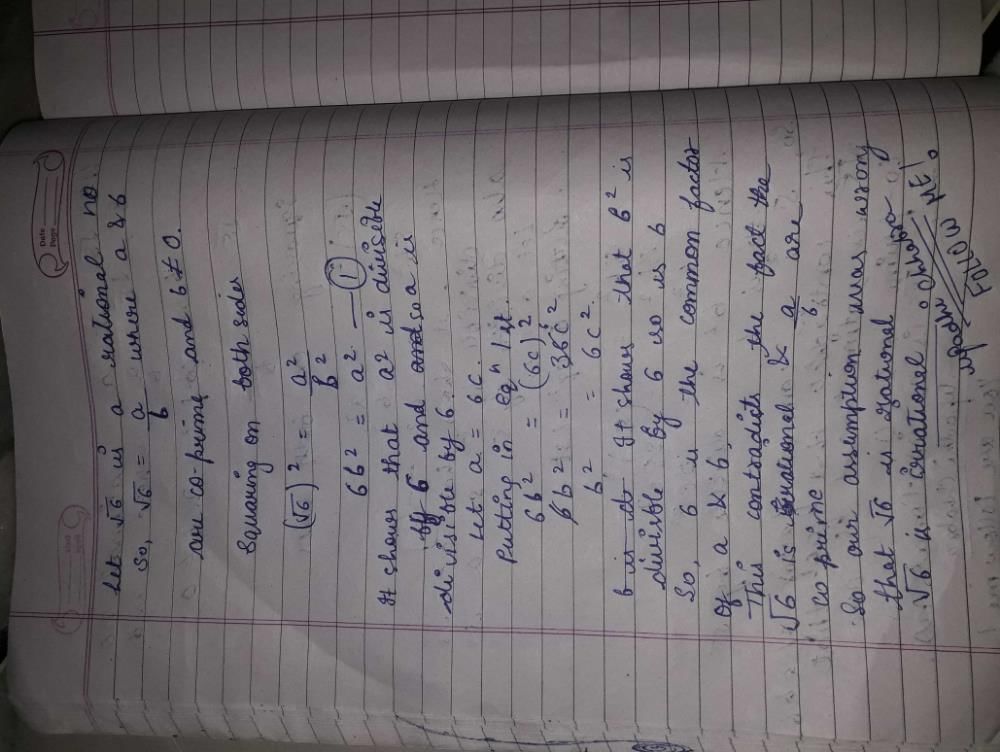Class 10 Exam > Class 10 Questions > prove that root 6 is irrational
Start Learning for Free
prove that root 6 is irrational
Community Answer
prove that root 6 is irrational
Proof that √6 is irrational
Assuming √6 is rational
If √6 is rational, then it can be expressed as a ratio of two integers a and b in the simplest form such that:
√6 = a/b
Where a and b have no common factors other than 1.
Squaring both sides
Squaring both sides of the equation, we get:
6 = a^2/b^2
Multiplying both sides by b^2, we get:
6b^2 = a^2
This means that a^2 is an even number because 6b^2 is even. Therefore, a must also be even.
Expressing a as 2k
We can express a as 2k, where k is an integer.
a = 2k
Substituting this in the equation above, we get:
6b^2 = (2k)^2
6b^2 = 4k^2
3b^2 = 2k^2
This means that 2k^2 is an even number because 3b^2 is odd. Therefore, k^2 is even and k must also be even.
Contradiction
We have now shown that both a and b are even, which means that they have a common factor of 2. This contradicts our assumption that a and b have no common factors other than 1. Therefore, our assumption that √6 is rational must be false.
Conclusion
We have shown that √6 is irrational because it cannot be expressed as a ratio of two integers in the simplest form.
Attention Class 10 Students!
To make sure you are not studying endlessly, EduRev has designed Class 10 study material, with Structured Courses, Videos, & Test Series. Plus get personalized analysis, doubt solving and improvement plans to achieve a great score in Class 10.

|
Explore Courses for Class 10 exam
|

|
Similar Class 10 Doubts
prove that root 6 is irrational
Question Description
prove that root 6 is irrational for Class 10 2024 is part of Class 10 preparation. The Question and answers have been prepared according to the Class 10 exam syllabus. Information about prove that root 6 is irrational covers all topics & solutions for Class 10 2024 Exam. Find important definitions, questions, meanings, examples, exercises and tests below for prove that root 6 is irrational.
prove that root 6 is irrational for Class 10 2024 is part of Class 10 preparation. The Question and answers have been prepared according to the Class 10 exam syllabus. Information about prove that root 6 is irrational covers all topics & solutions for Class 10 2024 Exam. Find important definitions, questions, meanings, examples, exercises and tests below for prove that root 6 is irrational.
Solutions for prove that root 6 is irrational in English & in Hindi are available as part of our courses for Class 10.
Download more important topics, notes, lectures and mock test series for Class 10 Exam by signing up for free.
Here you can find the meaning of prove that root 6 is irrational defined & explained in the simplest way possible. Besides giving the explanation of
prove that root 6 is irrational, a detailed solution for prove that root 6 is irrational has been provided alongside types of prove that root 6 is irrational theory, EduRev gives you an
ample number of questions to practice prove that root 6 is irrational tests, examples and also practice Class 10 tests.

|
Explore Courses for Class 10 exam
|

|
Suggested Free Tests
Signup for Free!
Signup to see your scores go up within 7 days! Learn & Practice with 1000+ FREE Notes, Videos & Tests.


























